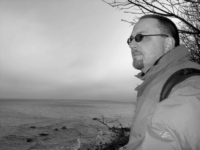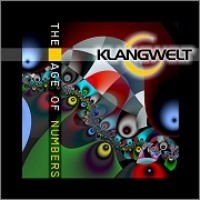|
Since 2002, the music of Klangwelt, aka Gerald Arend, has pleased the ears of lots of fans of electronic music. Time to have a chat with this German audio-designer from Norderstedt, near Hamburg, who works for the multimedia- and computer-game industry.

Gerald, please tell us about your background, what made you decide to start the project Klangwelt?
A friend of mine and I did some recordings in the area of the “Neue Deutsche Welle”-music in the early 80s, followed by a self-distributed Independent-Pop/Rock-album that was released in 1995. These projects were a great opportunity for me to gather some equipment and develop my skills up to a level where I could finally start to produce my own electronic music. And that’s what I wanted to do ever since I heard Jean-Michel-Jarre’s “Oxygene” back in the late 70s …
How did your stunning debut-cd “Weltweit”come along? What did you have in mind for the music, how was it composed, what kind of gear did you use then?
“Weltweit” is a kind of collection of the first Klangwelt-years. The tracks were produced over a period of about 4 or 5 years. I didn’t have something special in mind while recording them, but always hoped that I could release them on cd some day …
The tracks on “Weltweit” were mainly produced on a Korg 01/W FD workstation, most drums were done on the Kawai XD-5 drum-synthesizer. In addition, I used a Quasimidi Technox preset-synthesizer, a Korg Prophecy and sometimes an old Korg DS-8. The basic parts of the last track, “Different Colours”, however, were already made on what became the main instrument on my next album, a Korg Triton workstation.

Were you surprised by the success of “Weltweit”, did you get lots of fan mail?
Oh yes, indeed … I wasn’t only surprised, I was stunned by the success, especially when the album and some of the tracks were awarded at the Schallwende- and Schwingungen-elections 2002 …
I never got “lots” of fan mail, but the few I receive come from all around the globe. It’s really funny: You’re sitting in your flat, doing some recordings on your own, publish them on cd, and suddenly people from New Zealand, Spain and the USA write to you to tell you that they really enjoy your music – incredible! I had never expected this, and I’m always happy like a child when I receive some lines from a listener.
Was it difficult to compose new music after “Weltweit”? Were there things you liked to improve in your music?
All of the awards, especially the “best album of the year”-award from Schwingungen for “Weltweit”, turned out to be a kind of burden to me. I felt like paralyzed … how could I start creating a worthy successor for an album that took me five years in the making?
Fortunately, at that time I had acquired some new instruments in order to make my music sound somehow warmer, richer and more modern. Besides my new “main-workstation” – a Korg Triton – I worked with an Access Music Virus C to add some more “analogue” feeling, “screaming” leads and really fat basses. I always wanted to have a vector-synthesizer in my collection, so I also bought a Korg Wavestation SR at eBay. This unit finally gave me the opportunity to create these great “wavesequences” that consist of many small, rhythmical fragments made up from different sampled sounds – I simply love this kind of “living” sounds and often prefer them to “real” sequences. It took me a while to get used to all of the new instruments, but in the end I got an incredible amount of inspiration from them.

“Age of Numbers” is a concept album that takes a further step in your straightforward and driven music. How did you start working on it?
I read a lot of books about mathematics in those days, spent hours drawing fractals on the PC, and I really felt inspired by the incredible possibilities of the new instruments. So it was nothing else than a logical conclusion for me to make an album about the elegance and beauty of mathematics and numbers. It all seemed to fit perfectly, especially because the sound of all my digital keyboards and synthesizers is based on nothing else than advanced mathematics. Once I had recorded the first track (that actually was the opener “Zero”), I managed to complete the album in about twelve or fifteen months. That’s really lightning-fast for me …
You only once seem to have performed your music live. Isn’t that strange, as your energized music would be very suitable for that?
I don’t think that I’ll do any of my “cd-music” live. I don’t have time or money to set up a larger band and professional show for performing the rather fully arranged tracks from my cds, and I don’t want to do a one-man-show where some 70 percent of the sounds are coming from the sequencer or a playback, with me standing at the synthesizers and pressing some black and white keys … that’s not my cup of tea.
What I really like is to perform at such occasions where the location itself becomes a main part of the entertainment. I’ve performed live twice at the cooling-tower at Kalkar, along with a dozen of other musicians. The open cooling-tower has incredibly rich “surround-acoustics”, and it was an incredible experience to play there. But once again, I didn’t play any of my tracks from my first two cds, but some songs that I had made especially for this occasion. But at least a studio-version of my last year’s “Kalkar”-track actually made it on my new album – it’s called “Bed of Clouds”.
What kind of instruments do you use, and can you reveal some of the magic behind the high quality production and mastering of your music?
My current setup mainly consists of a Roland Fantom X7, Korg Triton, Access Music Virus C, Korg Wavestation SR and Korg 01/W FD, along with some effect-units and a mixer etc. – and that’s it. No more secret ingredients, no voodoo or other magic … On the contrary, I am recording in a rather “old-fashioned” way. While most musicians these days do multi track-recordings on the PC or Mac, I prefer to work with the built-in sequencer of my main workstation. When I record my tracks, all synthesizers are triggered (“played”) by the workstation’s sequencer in realtime. All of the required effects like reverbs, echoes etc. are either created with the built-in effect-units of the synthesizers or with hardware-effect-units – once again, no computer or multi track-recorded involved here. I then do a digital recording of the final stereo-mix with the PC – which means that I need to create a perfectly balanced mix before I can do so. Once a song is recorded, the mix can no longer be changed or edited – that’s the major drawback of my method. But this kind of “workstation-based” method has other advantages. I can better concentrate on my instruments, and it actually forces me to give my very best before recording can place. This pressure is just what I need to get things really done. An important part of the Klangwelt-sound is the mastering. I do all of the mastering myself, assisted by a friend who’s a sound-engineer. This step is done on a PC with specialized software. At this stage, I also add some more sound-fx like voice-samples etc., do the cross fades between the tracks or even create complex sound-collages to glue the single tracks together. I like it when the songs are somehow interwoven. That’s something that I’ve copied from older Pink-Floyd-records. All of these sound-effects, voice-samples and noises that are “scattered” on top of my music add a little surrealistic, mysterious flavour to my music – I simply can’t do without.
Do you consider working with other musicians sometime, or do you feel Klangwelt is a one-man-project?
Although the idea of working with other musicians is appealing, I don’t think that I will have the time and opportunity to be part of a “musical cooperation”. I don’t know any other electronic musicians in my area, all of my colleagues are either from West Germany, Berlin or other European countries. Since I don’t produce my music on a computer, I cannot be part of an “internet-project” … so there aren’t too many chances that I’ll be part of a musical partnership in the near future, sorry …
What’s you opinion about nowadays electronic music scene, the technical side the music, the fans etc.
Well, to be honest, I rather seldom listen to “classic” electronic music, so I don’t think that I’m the right guy to answer the first question … when I listen to music, I prefer styles like Independent-Rock, Singer-Songwriter-tunes or “darker” Electro-music. I believe this is the reason why many of my tracks are structured like pop-songs rather than being floating “Berlin school”-pieces …
The lovers of classic EM are the most loyal fans one could think of. If you happen to visit some EM-events, you’ll see the same faces again and again. They’re really nice folks, it is always a very familiar atmosphere from the very first moment. I really appreciate that, but at the same time I also wished that this really great community could attract more young listeners.
Modern electronic instruments – hard- and software – have grown into incredible powerful tools that are (more or less) easy to operate, affordable and come pre-programmed with sheer loads of powerful sounds. While many “traditionally” oriented EM-colleagues prefer working on “real” analogue equipment from the 70s and 80s, I’ve sold my only analogue synthesizer some years ago – I had never used it on a Klangwelt-track and I don’t miss it a bit. I prefer working on digital hardware; instruments like the Fantom X or Triton deliver exactly the type of rich, warm sound that I need to create the typical Klangwelt-sound. I simply couldn’t make that kind of music with analogue gear.
Where do you get you inspiration from?
Most of the time, it’s the sounds that inspire me. I sit at my keyboards, just playing around, fiddling around with all the nice knobs, switches and displays, stepping through the tons of sound-presets until I find something interesting. Or I start to program new sounds from scratch, just for fun, until I have created something that catches my attention. Another important source for inspiration is the internet. When time permits, I love to surf the depths of the WWW in search of interesting sounds and speech-samples, for example the muezzin’s voice in the track “Okzident” …
What direction will your new music take?
“Xoio” adds some new flavours to my style. While some songs (like the title track) seamlessly match the tradition of my first two cds, I’ve tried to involve a lot of fresh influences and sounds. You can hear some world-music-influences and bizarrely processed foreign chants and vocals; I’ve added some modern appealing, pumping beats here and some more surrealistic colours there, played a few Krautrock-like tunes, some slightly jazzy harmonies and even some real dark and sinister tones. The album reflects all the variety of music that I like to listen to. I think it’s the most varying cd I’ve made so far, and I really hope that it will appeal not only to fans of traditional EM …
You had two excellent reviews in E-dition on your two cds. Did you notice this in any way?
… and I always wondered why suddenly people were interested in my stuff!
Nah, to be sincere: I can’t say if the E-dition-reviews in particular have increased the sales, but “The Age of Numbers” got a number of really good reviews in some magazines and the WWW. I believe all of the writers have contributed much to Klangwelt’s success. Thanks a lot!
Discography:
Weltweit (2002)
The Age of Numbers (2003)
Xoio (2006)
Website: www.klangwelt.info |



